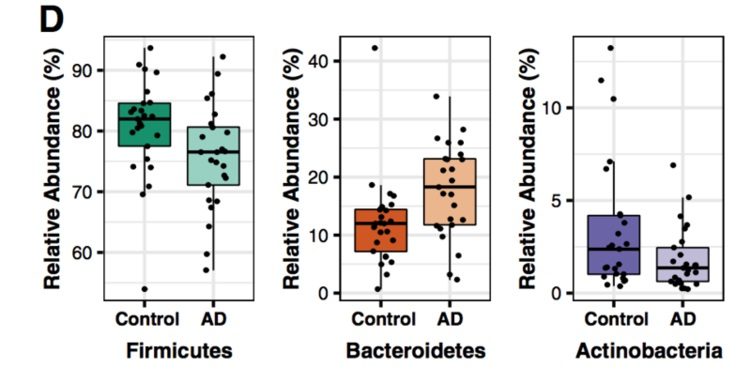Gennemgående havde patienterne med Alzheimers en reduceret tarmfloradiversitet, såvel som enkelte bemærkelsesværdige forskelle i bakteriernes talrighed.
"Patienterne med Alzheimers havde lavere forekomst af firmicutes og actinobacteria, og øget forekomst af Bacteroidetes sammenlignet med kontrolpatienterne," skrev forskerne.
Firmicutes bacterien kan hjælpe med omsætningen af glucose. Diabetikere og overvægtige personer har færre af dem. Mange actinobacterier, og særlig en undergruppe kaldet Bifidobacterium, anvendes i probiotiske midler og bekæmper muligvis betændelse i kroppen. På den anden side er høje niveauer af bakteroides afsløret i patienter med Parkinsons sygdom, en anden neurodegenerativ sygdom.
Comment: Delvist oversat af Sott.net fra Different gut bacteria in Alzheimer patients
Se også: Højt kolesterol formindsker risiko for Alzheimer's & Demens
Artikel i BT 'Epokegørende' Alzheimer-behandling: 9 ud af 10 patienter fik evnen til at huske igen
The current study is only correlational, so the differences in gut bacteria may result from Alzheimer's disease rather than contribute to it. However, research published earlier this year showed that transferring the intestinal bacteria of mice afflicted with Alzheimer's into the guts of germ-free mice caused the germ-free mice to develop more beta-amyloid plaques in the brain compared to if they had received bacteria from healthy mice. Beta-amyloid plaques are a hallmark sign of Alzheimer's, accruing on the neurons of people afflicted with the disease.
The researchers admit that pharmaceuticals could be influencing their study's results. Nearly all of the Alzheimer's subjects were taking the medications donepezil or rivastigmine, and it is not known how these drugs affect the gut microbiome.
It's becoming very clear that the gut and brain are intimately linked. As many as 500 million neurons dwell in the gastrointestinal system and are connected to the brain via the vagus nerve. Thus, gut bacteria have access to the brain via a veritable a super-highway, and can influence it in both good and bad ways.
The present findings add Alzheimer's to a growing list of conditions linked to changes in gut bacteria, which includes obesity, diabetes, irritable bowel syndrome, and Parkinson's disease.
Alzheimer's disease affects more than 30 million people worldwide and there is presently no way to stop or even slow its progression. The researchers hope that gut bacteria could open doors to previously unforeseen treatments.
Source:
Vogt et al. "Gut microbiome alterations in Alzheimer's disease." Scientific Reports 7, Article number: 13537 (2017) doi:10.1038/s41598-017-13601-y




Læserkommentarer
dig vores Nyhedsbrev